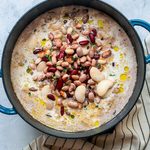Why you should eat fat to get slim
Recent data shows that most people shed pounds more successfully on diet containing moderate amounts of fat than they do on very low-fat regimens. Here’s why

Source: Adapted from Swap & Drop Diet, Best Health (Reader’s Digest Canada); Image credit: iStockphoto.com
For years nutritionists told us to cut back on fat; too much fat on the menu makes people gain weight, they said. Gram for gram, fat contains twice as many calories as protein or carbohydrates, they pointed out. Just as bad, it puts our hearts and arteries at risk by increasing cholesterol.
We listened. Over the past decades, the total percentage of calories from fat in the Canadian diet has fallen considerably. But now, in a stunning reversal, the experts are offering very different advice: Some fats are actually good for our hearts. What’s more, rather than helping you lose weight, slashing fat may actually make it harder to maintain a healthy weight. Very low-fat diets could even be unhealthy.
Good fat, bad fat
The truth is, experts have long known that there are various kinds of fat. The two main categories are saturated fat and unsaturated fat. Saturated fat comes mostly from animals, either in the form of meat or from cheese, milk and other dairy. Unsaturated fat comes mainly from plants and fish. Some of the biggest sources in our diets are vegetable oils such as corn, safflower, olive, peanut and canola.
When it comes to heart disease, the culprit is saturated fat. Because of its chemical makeup, saturated fat causes the body to churn out extra LDL cholesterol, which is the harmful, artery-clogging kind.
Unsaturated fat, in contrast, has been shown to lower LDL and raise HDL cholesterol, the friendly form that removes dangerous cholesterol from the body. Remarkably, getting plenty of unsaturated fat actually protects your arteries from hardening. Studies around the world have found the same thing: The less saturated and more unsaturated fat people eat, the lower their risk of heart disease.
Some particular unsaturated fats called omega-3 fatty acids are not only great for your heart and arteries, but battle inflammation throughout your body and help prevent several major diseases. Omega-3s can even help lift mild depression, making you feel more energetic. They are abundant in salmon, mackerel, tuna and flaxseed oil. Because these are foods most people don’t eat frequently, they are increasingly being taken in supplement form. Who knew doctors would one day be recommending a kind of fat pill?
Carbohydrates: Not so simple
When we cut back on fat, we replaced it with carbohydrates, mostly the simple kind found in white rice or bread. That’s bad news: A high-carb, low-fat diet increases levels of triglycerides, a form of fat in the blood linked to a greater danger of heart disease. Second, a diet low in fat and high in simple carbohydrates may make it harder, rather than easier, to lose weight. The surge in blood sugar caused by simple carbs triggers a surge in insulin from the pancreas. One of insulin’s jobs is to move blood sugar into muscles, where it provides fuel for movement. But another of its roles is to prompt the body to store excess energy as fat. If blood sugar and insulin levels continually spike and then drop, it can spell trouble.
The resulting rollercoaster makes people hungry more often, and the surges of insulin prime the body to store fat. Cutting back on total fat and filling up on simple carbohydrates hasn’t made is thinner. Instead, we’re fatter than ever.
Eat fat, get slim
A diet with moderate amounts of fat is simply more satisfying than a harsh low-fat regimen. And it’s the only kind of diet that really works over the long term. Another reason may be that people consuming moderate amounts of fat are less likely to overdo simple carbohydrates and will find it easier to keep hunger in check.
Replace saturated fat with unsaturated fat wherever you can. Switch from butter to olive or canola oil, for instance, and eat less meat and more fish. keep portion sizes and calories under control, and steer toward more complex carbohydrates like those in whole-grain breads and cereals.
Did you know you could change your life in 12 weeks? This simple 12-week step-by-step plan serves up no-nonsense strategies and easy lifestyle changes that tackle one meal, one change… one day at a time. Order your copy of Best Health’s Swap & Drop Diet today!




